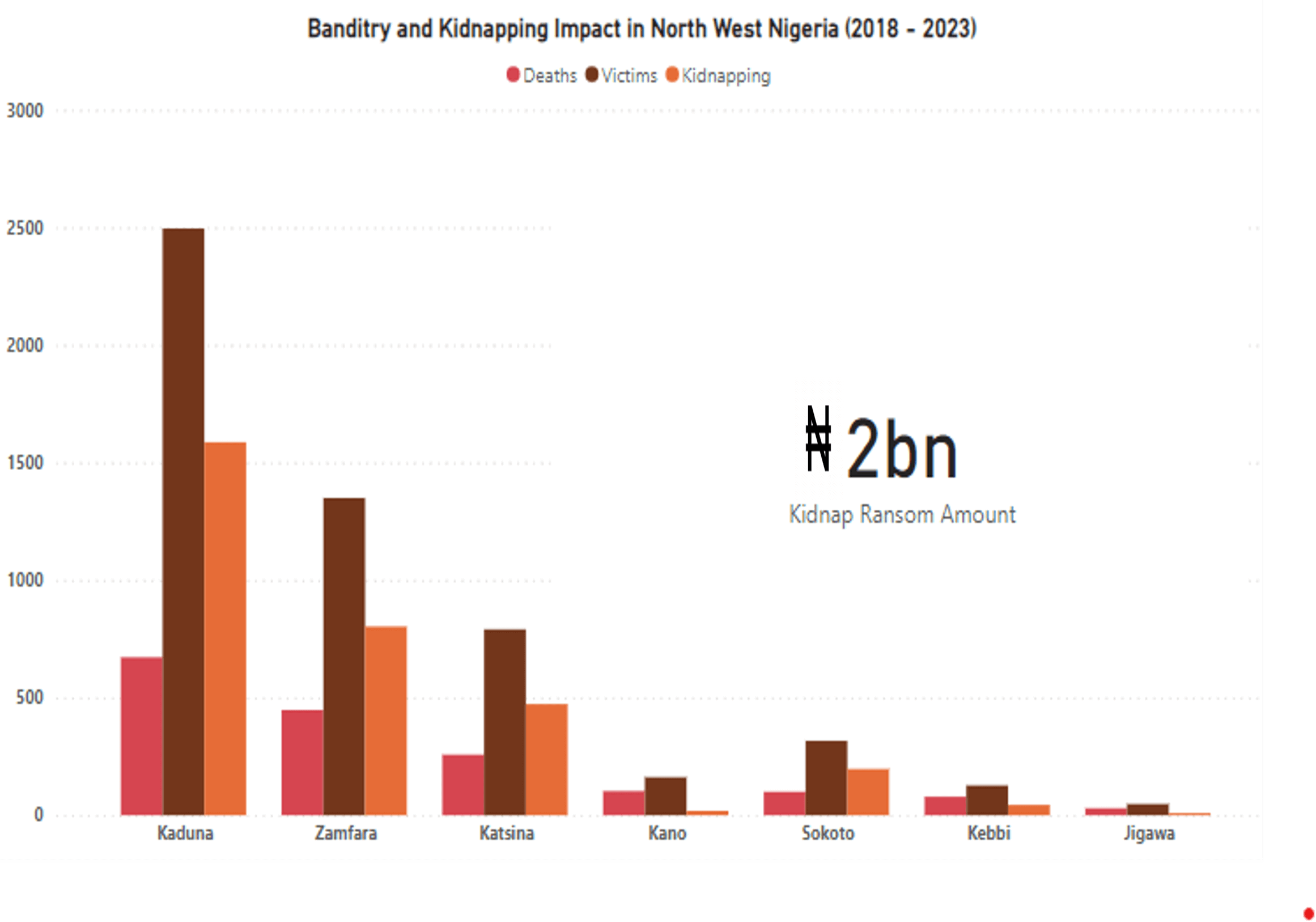Insights
The North-West region of Nigeria, encompassing states like Zamfara, Katsina, Sokoto, and Kaduna, has seen a dramatic rise in banditry and kidnapping in recent years. This surge in violent activities has profound implications for local communities and businesses, exacerbating socio-economic challenges and undermining regional stability.
Banditry and kidnapping have escalated dramatically in Northwestern Nigeria. Bandits, often heavily armed, engage in cattle rustling, village raids, and abductions for ransom. These crimes are typically carried out by organized groups exploiting the region's vast, sparsely populated terrain, making it difficult for security forces to effectively monitor and respond.
Data from the Nigeria Risk Index highlights the alarming increase in bandit attacks, with Kaduna state recording the highest number of victims of banditry between 2018 and 2023. Across all states, at least a sum of N2bn naira has been demanded or paid regarding banditry in the North West. The International Peace Institute (IPI) also estimates that between 2010 and May 2023, over 13,485 deaths were linked to banditry.

Source: Nigeria Risk Index
Several factors contribute to the rise in banditry and kidnapping. Some of these are Economic deprivation which has resulted from poverty and unemployment providing fertile ground for criminal activities as disenfranchised youth seek alternative means of survival. Environmental changes also result in desertification and the depletion of arable land. This tends to drive pastoralists to migrate and often leading to clashes over resources with farmers and subsequent retaliatory attacks. Lastly, Armed conflicts and the influx of weapons from countries like Libya and other conflict zones have armed non-state actors, exacerbating violence in the region.
Impact on Local Communities
The insecurity has forced over 450,000 people to flee their homes, leading to a humanitarian crisis where many are left begging on the streets or reliant on local community support. This displacement disrupts local economies, exacerbates poverty, and leads to widespread food insecurity, with nearly three million people critically affected (The New Humanitarian).
Local communities have been driven to make uneasy peace deals with bandit leaders to avoid attacks. For instance, in Shinkafi, a local agreement with a notorious bandit leader, Bello Turji, allows the community to maintain some semblance of normalcy in exchange for payments and other concessions. These arrangements, however, are fraught with tension and are unsustainable in the long term as they depend on the whims of the bandits (The New Humanitarian).
The impact of banditry and kidnapping on local communities is devastating, this has led to some of the following:
- Loss of Lives and Displacement: Frequent attacks lead to significant loss of lives and mass displacement. The IPI estimates over 1 million people have been displaced within Nigeria due to banditry, with thousands fleeing to neighbouring countries like Niger.
- Psychological Trauma: Victims of kidnappings and their families often experience severe psychological trauma. The constant threat of violence fosters a climate of fear and insecurity.
- Disruption of Education: Schools are frequent targets for kidnappings and this has led to disrupting educational activities and depriving children of their right to education.
- Healthcare Challenges: The impact of banditry and kidnapping has also resulted in attacks on healthcare facilities and hamper access to medical services, exacerbating health crises.
Impact on Businesses
The pervasive insecurity hampers business activities, leading to significant economic losses. Markets are disrupted, and businesses are reluctant to operate in such volatile environments. For example, farmers face the dual threat of losing their produce to bandits or being forced to pay hefty "taxes" to continue their operations. This cascades food supply and prices, further destabilizing the region's economy (The New Humanitarian) (Brookings). From the Nigeria Risk Index, business risk in Kaduna is critical, significant in katsina and Zamfara and quite moderate in other states in the North West Region.
The business environment in the North-West has been severely affected:
- Agricultural Decline: Agriculture, the mainstay of the region’s economy, has been severely disrupted. Farmers abandon their fields due to fear of attacks, leading to reduced agricultural output and food shortages.
- Economic Downturn: Frequent attacks deter investment and commerce, leading to economic stagnation. Businesses are reluctant to operate in such volatile conditions, further exacerbating unemployment and poverty.
- Cost of Security: Companies that choose to remain operational incur significant expenses to ensure the safety of their employees and assets. These costs include hiring private security, installing surveillance systems, and paying for ransoms.
- Disruption of Trade Routes: Banditry on highways and roads disrupt the movement of goods and services, inflating transportation costs and leading to supply chain inefficiencies.
Government Response and Challenges
The Nigerian government's response has been inconsistent, oscillating between military action and attempts at negotiation. Despite military efforts, including airstrikes, the vast and forested terrain of the North-West provides bandits with ample hiding spots, making it difficult to achieve decisive victories. Moreover, military actions often provoke severe retaliations against local communities, exacerbating the insecurity (The New Humanitarian) (Brookings).
While the government has launched several initiatives to curb banditry, including military operations and dialogue with bandit leaders. However, these measures have had limited success due to:
- Insufficient Resources: The military and police are often under-resourced and ill-equipped to handle the sophisticated operations of bandits.
- Corruption: Corruption within security agencies undermines efforts to combat banditry, with reports of collusion between some officials and criminal groups.
- Lack of Coordination: There is often a lack of coordination among various security agencies, leading to inefficient and delayed responses to attacks.
Broader Implications
The situation in the North-West is compounded by poor governance, extreme poverty, and the effects of climate change, which drive many young people towards criminal activities as a means of survival. The region's proximity to other conflict zones in West Africa also makes it a fertile ground for the spread of terrorism. Some bandit groups have flirted with alliances with terrorist organizations, further complicating the security landscape.
The surge in banditry and kidnapping in Northwestern Nigeria poses significant challenges to local communities and businesses, threatening the socio-economic fabric of the region. Comprehensive strategies involving economic development, improved governance, and robust security measures are essential to address the root causes and mitigate the impact of these crimes. Ensuring the safety and stability of the North-West is crucial for the overall development and prosperity of Nigeria. Addressing this complex issue requires a multi-pronged approach that tackles the underlying causes of violence, improves security measures, and fosters dialogue among communities to rebuild and heal the region.

The Risk Control Team
Related Blog Posts
- GENOCIDE OF CHRISTIANS – IS NIGERIA GUILTY AS CHARGED?
- Is Nigeria under President Tinubu’s Administration, Finally Controlling Its Economic Risks?
- Northern Nigeria’s Peace Deals With Bandits: Truce or Time Bomb?
- The Dangote-Transporters Impasse: A Clash of Modernisation and Tradition
- Nigeria’s Mandatory Taxpayer Identification Number (TIN)Policy
